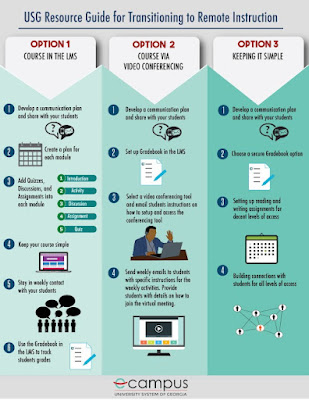To limit the spread of the Coronavirus Disease (COVID-19), University System of Georgia (USG) institutions transitioned to remote instruction in mid-March through the remainder of the spring 2020 semester. Institutions will continue with remote classes through the summer, with plans to resume on-campus operations in the fall. This safety precaution, along with several others (i.e., quarantine, social distancing, shelter-in-place, etc.) encouraged across the country and state, has resulted in an adjustment period for innovative e-learning formats. Faculty and students from the USG’s 26 institutions quickly migrated to emergency remote instruction, which differs from traditional classroom settings by regularly including virtual lessons, assignments, and interactions among instructors and students.
“We recognize that faculty and students are under a great deal of stress with this quick move to remote learning and that the situation is less than ideal” said eCampus Associate Dean, Dr. Jason Huett. “As eCampus is a leader in the virtual space, it was a good opportunity for us to step up and provide whatever assistance we could to ease this transition.”
“We recognize that faculty and students are under a great deal of stress with this quick move to remote learning and that the situation is less than ideal” said eCampus Associate Dean, Dr. Jason Huett. “As eCampus is a leader in the virtual space, it was a good opportunity for us to step up and provide whatever assistance we could to ease this transition.”
To support the USG’s efforts for delivering quality online instruction, specifically the Keep Teaching USG Initiative, the eCampus Faculty Development team created the USG Resource Guide for Transitioning to Remote Instruction, a free online training course for faculty members. In addition to the Resource Guide for faculty, eCampus also developed the Student Guide to Online Learning, a companion resource for students to access and navigate courses via the D2L learning management system (LMS).
Through a condensed triage-style training, faculty who are new to teaching online can gain knowledge of necessary tools, technology requirements, and best practices for building their courses, teaching, and connecting to their students through the D2L Brightspace LMS. The guide provides face-to-face faculty with a robust, yet timely, foundation for facilitating effective online instruction for their students, as well as additional development resources. The goal of this resource was to use alternative pedagogies to meet course objectives.
The estimated completion time for this self-paced course is 2-3 hours, and it is accessible through open enrollment. Also, there is no cost or textbook associated with this training. In the course, instructors obtain insight as to how to perform essential functions, such as gaining access online, communication processes, quizzes, and assignment submissions.
Dr. Beth René Roepnack, the Senior Academic Instructional Support Specialist for eCampus, who contributed to the design and distribution of the online course, recognized early on the unique challenges faculty would face when moving to remote instruction. Roepnack shared that eCampus “created the Guide to support faculty as they made the unprecedented and heroic transition of moving all their face-to-face classes online using remote teaching methods.”
Through this resource, faculty are provided with three different options to assist with their transition to remote instruction. The length of each course varies, as each format option consists of different details designed to meet the needs of the instructor. The first option provides an in-depth overview of steps needed to build an online class and includes an assortment of helpful tips and tricks for creating an engaging yet simple course in a short period. Instructors who intended to conduct their sessions via video conferencing were identified as better suited for option two, which offers a strategy for managing technology, communicating, and grading. “We particularly wanted to provide tools for supporting faculty and students who didn't have the technology or Internet access that regular online teaching and learning require,” Roepnack explained regarding the development of option 3, which provides teaching strategies for those with low bandwidth.
Dr. Beth René Roepnack, the Senior Academic Instructional Support Specialist for eCampus, who contributed to the design and distribution of the online course, recognized early on the unique challenges faculty would face when moving to remote instruction. Roepnack shared that eCampus “created the Guide to support faculty as they made the unprecedented and heroic transition of moving all their face-to-face classes online using remote teaching methods.”
Through this resource, faculty are provided with three different options to assist with their transition to remote instruction. The length of each course varies, as each format option consists of different details designed to meet the needs of the instructor. The first option provides an in-depth overview of steps needed to build an online class and includes an assortment of helpful tips and tricks for creating an engaging yet simple course in a short period. Instructors who intended to conduct their sessions via video conferencing were identified as better suited for option two, which offers a strategy for managing technology, communicating, and grading. “We particularly wanted to provide tools for supporting faculty and students who didn't have the technology or Internet access that regular online teaching and learning require,” Roepnack explained regarding the development of option 3, which provides teaching strategies for those with low bandwidth.
By Mia Fanning
Media Contact:
Katie Black, kblack@ecampus.usg.edu
Katie Black, kblack@ecampus.usg.edu


Comments